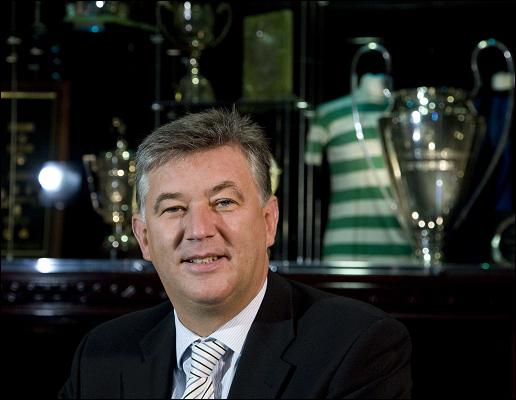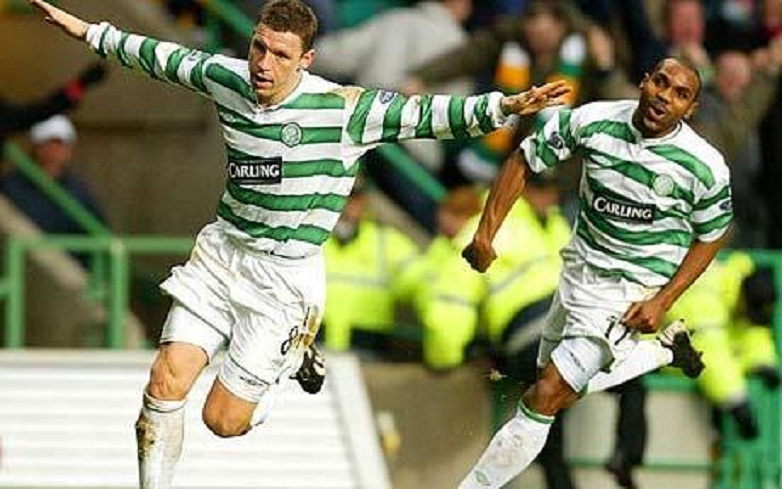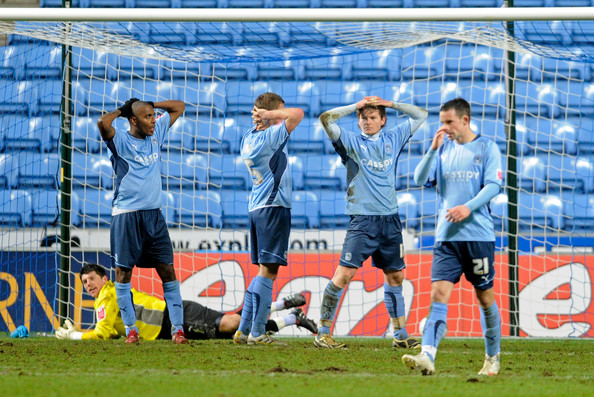Now Badr El Kaddouri was a last minute replacement for the injured Emilio Izaguirre that we had apparently looked at previously, but Victor Wanyama is another in a long line of “young players with a bright future”. But the one that raises the most eyebrows is Mohamed Bangura – a man who seemingly has a surname of “recommended-by-Henrik-Larsson”. All good and well, but was he recommended by the current Celtic manager, Neil Lennon? When Bangura was being signed up at the end of the transfer window, Neil was in Portugal looking at Baba Diawara. Oh look another African. In isolation, you could accept that we were hedging bets. But surely the manager would go to see the one he wanted? To me, this is looking more and more like a pattern spanning several transfer windows.
Another disturbing pattern is the increasing popularity of the “big-name target” story. Celtic get openly linked with a big name from down south – say Sol Campbell, Craig Bellamy, David James or even Jimmy Bullard. The manager, among others, will confirm that we are interested in them. For several seasons though it has been Celtic policy that signings are kept on the down low. The players that Celtic have actually signed have come out of the blue, with very little news being revealed until the new player has almost signed on the dotted line. So why are these big name targets different?
The mischievous part of me, and many others, would suggest that it could be to get the fans on side during the summer when the increasingly dipping season ticket renewals need to be paid up. But equally it could be that we are so close to the English market that keeping secrets is difficult, right? Well, we got Kris Commons fairly quickly and he came from England. He spent more time being linked with Rangers than he did being linked with us. We also got Gary Hooper signed up pretty quickly too, despite it being hot property following a good showing an one of the Championship’s poorer teams. Maybe they just wanted to come to Celtic while the big names all just happened to take ages to make up their mind before all deciding to sign elsewhere. Craig Bellamy twice in successive seasons.
Last summer though we saw exactly the transfer activity that we needed. The Tony Mowbray era was all but consigned to the bin and Celtic brought in virtually a new team worth of players to move forward. All was good and the squad was rich with talent.
Well, sort of. For one thing, we brought in the majority of those players relatively cheaply. Gary Hooper was the biggest outlay at a couple of million pounds. Even that was a steal given how much Andy Carroll – a man who scored less for a better team in the same league – went to Liverpool for a mere six months later. But the biggest eyebrow raiser was when we eventually sold Aiden McGeady to Russia for nearly £10 million. Surely the manager would get to spend some of that windfall? He certainly thought so, and said as much even before Aiden had signed for someone else. But no, that money was banked as we failed to qualify for Europe. In fact, it still hasn’t been spent, and two transfer windows have come and gone since. Mind you, we’re only half a million pounds in debt now, so smile for the balance sheet!
As I said, neither the January window nor the summer window this year saw much movement at all. Which is fine if you’re happy with the squad you have. At least we got rid of the deadwood, right? Wrong. We currently have three centre backs from the Strachan and Mowbray eras out on loan. Jos Hooiveld, Josh Thompson and Darren O’Dea are still Celtic players, even though they’re all playing in the lower leagues of England. It is blindingly obviously that not one of them is wanted at Celtic having been loaned out both last season and this season. Morten Rasmussen, the forgotten striker, is in the same boat. We can’t get rid of these players, so some suspect we won’t bring in replacements for fear of being stuck paying two lots of wages for one squad position.
You’d think that we can’t just release them from their contract. It happens all the time, allowing players no longer wanted to go for nothing. We could even sell them for a nominal fee. Why not? What’s the alternative, loan them out until their contract expires and then they go for nothing anyway? Who wouldn’t want a £100,000 instead of nothing at all? As a long term strategy that is pretty poor indeed. But we are stuck with these players for whatever reason.
Another thing that Celtic were criticised for was their non-movement in the January transfer window of 2009. We got Willo Flood in when everyone knew we really needed another striker. We ended up finishing that season with two 0-0 draws. Since we finished four points and two goals behind Rangers, had we won those two matches with even a single goal in each it would have seen us win the league. So did we learn from the mistakes of that season?
Well, this summer we saw Kelvin Wilson come in to a Celtic defence which was still smarting from losing cheap goals in Inverness – a defeat that ultimately cost us the league. But everyone – at least we thought everyone – knew that we needed more at the back. It never came, and although Adam Matthews also came in as a full back, the centre back role is where the problem still lies. We have since had to sit and watch as Celtic have conceded ridiculous goal after ridiculous goal. You can forgive people making mistakes if they learn from them, but Celtic clearly haven’t learned from this one, and that’s just criminal. Was in the manager? You could say that, but two separate managers making the exact same mistake? Hmmm…
Another criticism of the Peter Lawwell era I had eighteen months ago was that of downsizing the manager. Martin O’Neill came in as a high-flying Premiership manager who had won the League Cup with an unfancied team twice. He was replaced by a Premiership manager who had got one team relegated while another had lost in the FA Cup final. He was then replaced by a Championship manager who got his team into the Premiership before seeing them fall back out of it again without even looking like doing anything else and could only get to the semi-final in the FA Cup. That pattern continued it’s downward spiral as we appointed a completely untested and untried rookie manager.
Now, whether that gamble has worked or not remains to be seen. Last season looked good, but questions are already being asked this season. Have the events of last season taken their toll on Lennon? Has his calmer nature this season resulted in a team that don’t fight like they did last season? Who knows. I for one hope that Lennon can turn things around, but whether he can or not, the fact remains that Lennon was the easy appointment for the board. A fans favourite who was already working at the club and who could very probably do the job on the cheap. That last point is always a winner for the Celtic board.
The downsizing pattern continues in Europe too. Where once we were competing with Barcelona or Manchester United home and away, we went through a period of beating most teams at home while struggling away, before finally getting to where we are today – unable to beat teams who command a paltry sum of money when compared to what Celtic have at their disposal. Braga, Utrecht, Sion… you can understand the argument of not being able to compete with English Premier League teams thanks to the money Sky give them, but these teams bring in far less money than we do! But to be fair, we’re not the only Scottish team struggling in Europe these days.
Mind you, even across the city it’s a joke – but not the one we’ve been cracking. The Celtic support have had a good laugh at the perils of “the mighty Glasgow Rangers” as they proved just how “loyal” they are by not paying tax bills and then getting caught “red handed” for it. First the banks were in control, then they were taken over by a mythical billionaire – no millionaire – no maybe he’s just got a pound – but the tax case gorilla is still in the corner and they’re going to go into administration or, even better, liquidation any minute.
They’re still ten points clear of us already, with three titles in a row.
In my previous article I argued that the turning point on the field for Celtic was when “Smithy” came in and stopped Rangers dropping silly points. Fact of the matter is, they haven’t done that since, and even when we pushed them all the way last season it was us and not them that dropped more. They had to, we even beat them more than they beat us last season and that still wasn’t enough. McCoist – their own rookie manager – may now be in charge, but he’s been able to carry that on and that is why they are already so far in front. We dropped more points to St Johnstone at home in one match than they have over their opening ten fixtures.
We’re even sitting third behind Motherwell right now. Okay, so we’ve played a game less but our game in hand over them, and the rest of the league, is at home to Dunfermline – a team who so have have been scoring goals but have also been conceding them far too often. Sounds disturbingly familiar…
Money was another area I looked at in that previous article. When I wrote it, Celtic hadn’t produced their figures for 2010. So we’ll pick up where I left off shall we…
2009
Turnover: £72.59m
Operating Expenses: £61.36m
2010
Turnover: £61.72m
Operating Expenses: £57.25m
2011
Turnover: £52.56m
Operating Expenses: £52.50m
A point I made was that we were spending more money in 2009 than we were when we went to Seville in 2003. Well, good news, we’ve sorted that. Yes, we now spend SLIGHTLY less than the £53.84m we were spending in 2003. Mind you, we’ve also turned over £8m less. Good thing we don’t have to pay those European win bonuses like we did back then! In fact, turnover has dropped a whopping £20m in two years. How did we manage that? We can only account for the Champions League non-participation drop once! Once you cut that out you can’t cut it out again! Overall, in the last two years we’ve lost £20m turnover but only cut costs by £9m. Ahh but he debt blah blah blah.
Now, to be fair to Peter, he did make a valid point about the operating expenses at the roadshow last summer – something I had so much hope for. He made the point that costs had not dropped because wages across the board are increasing. The average wage of a player in the UK has risen, so we’re having to pay more and more money just to stand still. More accurately, we’re paying the same money we were to go backwards. Some would say that’s a shame and that we’re forced to do it because of our proximity to the English leagues. Others, like Mark Cooper, would say we’re doing it completely wrong by focusing on them so much – or possibly by not focusing enough on being a stepping stone into them.
As far as I can see, in the eighteen months since I hoped that the roadshows would be a new start and a new way forward for Celtic plc, we haven’t actually done anything different whatsoever. There’s still a smell of interference from upstairs, there’s still downsizing, we’re still not winning anything. In fact, we’re now struggling to even compete with tax case handcuffed Rangers, while Europe is pretty much a complete write off for us as things stand. Yet we’re still paying the same prices – if not more – to “support our team”. Season tickets went up by the VAT increase alone (which was actually a nice little dodge by Celtic) while I actually turned down an offer for a ticket for Ibrox because £42 was a joke. I know Rangers set that, but I’m fairly certain they get together with Celtic to discuss these things to ensure fairness for both sides. Or in other words I fully expect Celtic to charge their fans the same when they visit in December. I’m still paying £45 for a new jersey, except now we’re changing the away jersey so often it’s costing me twice as much. Even the Paradise Windfall ticket doubled in price from £1 to £2 yet the prize only went from £9000 to £15000! So How much longer is this going to continue?
The only logical conclusion to this, as far as I can see, is this. Whether or not Peter Lawwell is micro-managing every aspect of Celtic – and we’ve all heard those rumours on the Celtic Underground podcast never mind my own analysis of his tenure here which just so happens to tie up – does not matter. Fact of the matter is, he is failing even his own targets. Further, by his own admission what we are paying now is not getting us the value we were seeing previously. Continue down that path and we will continue to go backwards until we aren’t just third in the league in October, but third in May. Or possibly worse.
So do we increase prices? People are barely willing to pay what they are being charged now. No, putting prices up will just make matters worse and probably reduce income further. it’s clear that fundamental changes are required at Celtic. If Peter Lawwell is not the man to bring about those changes – and by the look of the last eight years he is not – then he must stand aside and make way for someone who is.
What of the rest of the board? They must take some of the blame for this. Either they’ve been pulling Lawwell’s strings all this time or they have sat back and let him do as he pleases for too long. Either way, if they are truly the Celtic fans they claim every time it’s suggested that we put a fan on the board, then they cannot be happy to allow the club to continue along the so very obvious decline that it is in. Perhaps it’s time for wholesale changes in that area too.
But one look at the ballot sheet that Shareholders have for the current AGM proves that we will get none of this. Harry Brady’s revival plan has little chance of being implemented. Which is a shame, because at least in that situation the Celtic support would only have themselves to blame for Celtic’s woes. Or better still, triumphs. No, what we will get during Celtic’s AGM is confirmation that Celtic are being run by a small group of people who will go on to prove it by ensuring that several of them are reappointed as directors to the board through the majority of shareholdings they own between themselves. They will then go on to chase off the Celtic Trust’s suggestion of fresh blood from within the general fan base as they have done on several previous occasions.
Among those up for reappointment is the name of Peter Lawwell. I’m not looking forward to writing part three of “The Lawwell Years”.





